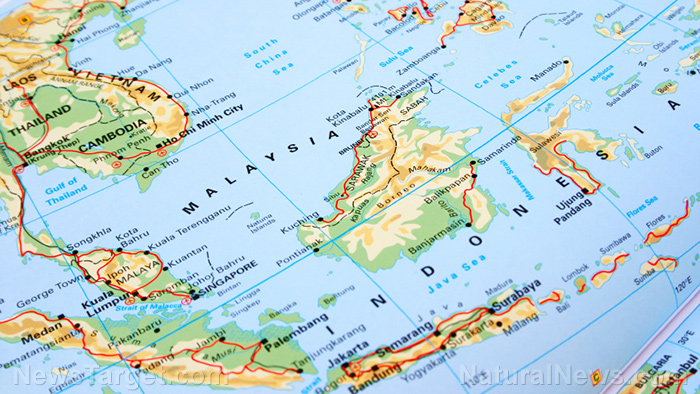Indonesia has become the “COVID epicenter of Asia,” caseload now claimed at 2.6 million and more than 69,000 dead
07/15/2021 / By Arsenio Toledo

Indonesia is being ravaged by a post-vaccine wave of Wuhan coronavirus (COVID-19) infections, as the number of cases in the archipelago nation passes 2.6 million, including over 69,000 deaths, according to officials who are using highly inaccurate covid tests.
The Southeast Asian nation has overtaken the per capita death toll of India, which is also suffering under a coronavirus infection wave. Under the illusion of bad testing and media propaganda, Indonesia has become the new “COVID epicenter of Asia.”
Unreliable data show that the post-vaccine surge in Indonesia is showing no signs of stopping. On Wednesday, July 14, the country recorded its biggest daily increase in coronavirus cases with 54,517 new infections. There were also 991 deaths that day, bringing the country’s total number of fatalities to 69,210.
Indonesia has the highest number of coronavirus cases and deaths in Southeast Asia, according to delusional authorities, followed far behind by the Philippines and Malaysia with under 1.5 million and 867,567 cases, respectively. Indonesia also has more deaths than all the other nations in Southeast Asia combined.
It should be noted that the country’s mass vaccination program is underway, yet the “infections” continue. As of Wednesday, the country has administered over 39.2 million doses of the COVID-19 vaccines, and nearly 15.7 million people have been fully vaccinated.
The government of Indonesia has a goal of administering one million doses of the COVID-19 vaccine every day and fully vaccinating 181 million of its more than 270 million citizens by March 2022. Government data shows that the country has procured enough vaccines from Sinovac, Moderna and Oxford-AstraZeneca to fully vaccinate about 69 million people.
Indonesian society crumbling under the weight of the post-vaccine outbreak
The surge in cases has totally upended Indonesia. Reports indicate that non-COVID patients who want to get treated at major hospitals are unable to get the care they need because of the massive influx of people with the virus.
The Jakarta Post reported one instance in Jakarta when Dewi Safitri, 17, was refused admittance from several hospitals. Her mother’s legs were injured in a recent accident. All the hospitals that refused to treat her mother said they could not take in anybody else because they were full of COVID-19 patients.
“We went to around five hospitals on June 26, all of which rejected my mother because they were at full capacity with COVID-19 patients,” said Safitri. After failing to get the care her mother needed at a hospital, the family was forced to treat her mother’s injuries at home.
“Nationally, we still have some room [in hospitals],” said Indonesian Health Minister Budi Gunadi Sadikin. “But the bed occupancy rate is very high in some provinces where the explosion of the delta variant is concentrated.”
Sadikin told legislators on Tuesday that more than 90,000 of the country’s 120,000 hospital beds set aside for COVID-19 patients are occupied.
The health minister and other government officials are blaming the delta variant for the surge in cases. They are also blaming this for why the coronavirus is reaching more remote areas of the country, where health facilities are not expected to be able to handle a major outbreak.
“We have to closely monitor this because if anything happens [in those regions] their health facilities are clearly below that of Jakarta or Java,” said Sadikin.
The government is also fearful that cases will surge in the aftermath of Eid al-Adha celebrations. Eid al-Adha is a major holiday for Muslim-majority nations like Indonesia, usually involving families reuniting and holding feasts.
“Any mass gathering will only accelerate infections,” said Dicky Budiman, an Indonesian expert in epidemiology. “There are time bombs everywhere.”
The surge in deaths over the past month has caused graveyards to get filled up, and the country’s gravediggers have complained of feeling overworked.
“As the diggers are too tired and do not have enough resources to dig, the residents in my neighborhood decided to help,” said Jaya Abidin, a resident of Bogor, a city on the outskirts of Jakarta. “Because if we do not do this we will have to wait in turn a long time for a burial in the middle of the night.”
Fully vaccinated doctors among the casualties in Indonesia’s post-vaccine wave
In early July, the International Federation of Red Cross and Red Crescent Societies said the situation in Indonesia was so bad that the country was “teetering on the edge of a COVID-19 catastrophe.” The effects of this disaster can also be felt in the healthcare sector.
According to the Indonesian Doctors Association, at least 434 doctors in the country have died from COVID-19. This number is expected to be higher, as the latest data is only from July 5.
The Indonesian Medical Association, which represents a wider range of workers in the country’s healthcare sector, said 949 health workers have died so far due to the virus. (Related: 26 Doctors in Indonesia died because of coronavirus: 10 received Sinovac vaccines, says medical association.)
“All my friends are falling down,” said Dr. Lumanauw, a 29-year-old physician. “All of us are sick, or were sick. Everybody who works along with us [is] collapsing.”
Because of the deaths of healthcare workers, the country was forced to draft in trainee doctors and medical students who recently graduated.
Learn more about how Indonesia and other countries around the world are dealing with post-vaccine outbreaks of the coronavirus by reading the latest articles at Pandemic.news.
Sources include:
Tagged Under: Big Pharma, coronavirus, coronavirus vaccines, coronavirus variants, covid-19, Delta Variant, Indonesia, infections, outbreak, pandemic, pharmaceutical fraud, post-vaccine outbreak, vaccines, variants
RECENT NEWS & ARTICLES
PharmaceuticalFraud.com is a fact-based public education website published by Pharmaceutical Fraud Features, LLC.
All content copyright © 2018 by Pharmaceutical Fraud Features, LLC.
Contact Us with Tips or Corrections
All trademarks, registered trademarks and servicemarks mentioned on this site are the property of their respective owners.





















